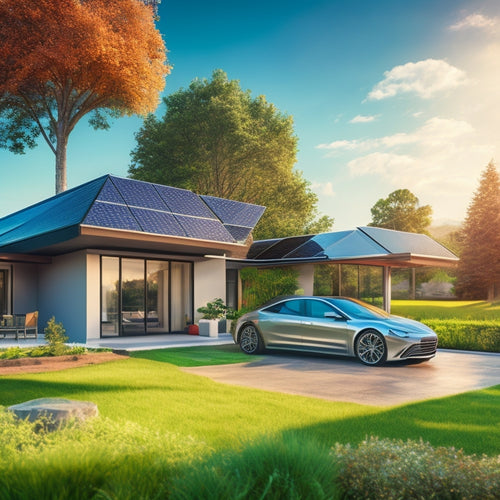
What Are the True Cost Savings of Solar?
Share
By switching to solar power, you can expect to save money on energy bills immediately, with the potential to offset up to 100% of your utility costs, thanks to the clean energy generated by your solar panel system. You'll also benefit from long-term savings through incentives like federal and state tax credits, rebates, and property tax exemptions. Additionally, solar panels require minimal maintenance and repair, and can even increase your property value. As you explore the benefits of solar power, you'll discover more ways to maximize your cost savings and reap the rewards of a sustainable energy solution.
Key Takeaways
• Solar power immediately reduces energy expenditures by offsetting utility bills, leading to substantial cost savings.
• Federal and state incentives, such as tax credits and rebates, can substantially offset the upfront costs of installing solar panels.
• Solar panels require minimal maintenance and repair costs due to their durable design and lack of moving parts.
• Installing solar panels can increase property value by up to $15,000, making it more attractive to potential buyers.
• Solar energy provides a safeguard against escalating energy expenses, allowing homeowners to lock in a fixed energy rate and minimize their carbon footprint.
Immediate Reduction in Energy Expenditures
By switching to solar power, you can immediately reduce your energy expenditures, as the electricity generated by your solar panels offsets your utility bills, leading to substantial cost savings.
This reduction in energy expenditures is a direct result of the increased energy efficiency of your home or business. With solar power, you're generating your own clean energy, reducing your reliance on the grid, and subsequently, your energy bills.
When conducting a cost analysis of your energy consumption, you'll notice that solar power substantially reduces your energy expenditures.
The amount of energy generated by your solar panels is subtracted from your total energy consumption, resulting in lower utility bills.
This reduction in energy expenditures can be substantial, especially for those who consume a lot of energy. By going solar, you can enjoy immediate cost savings, which can be reinvested in your home or business, or simply saved for the future.
With solar power, you're not only reducing your environmental footprint but also taking control of your energy costs.
Long-Term Savings Through Incentives
You can capitalize on numerous incentives, including federal and state tax credits, rebates, and property tax exemptions, to further reduce your solar power investment costs.
These incentives can substantially offset the upfront costs of installing solar panels, making the shift to renewable energy more affordable.
For instance, the federal government offers a tax credit of up to 26% of the total solar panel system cost. Additionally, many states provide their own tax credits, rebates, and exemptions, which can be stacked on top of federal incentives.
Local governments may also offer subsidies to encourage the adoption of solar energy.
By taking advantage of these incentives, you can notably reduce the net cost of your solar power system.
For example, a $20,000 solar panel system could be reduced to $12,000 after applying federal and state incentives, making it a more financially viable option.
Reduced Maintenance and Repair Costs
Your solar panel system's durability and simple design translate to minimal maintenance and repair costs over its lifespan. This means you can enjoy the benefits of solar energy without worrying about frequent repairs or replacements.
No moving parts: Solar panels have no moving parts, reducing the risk of mechanical failure and the need for repairs.
Durable panels: High-quality solar panels are built to last, with some manufacturers offering extended warranties of up to 25 years or more.
Minimal cleaning required: Solar panels are designed to be self-cleaning, but even occasional cleaning is a simple process that can be done from the ground.
Professional maintenance is rare: With solar panels, you won't need to worry about regular tune-ups or maintenance checks, saving you time and money.
Increased Property Value and Credibility
Installing solar panels can substantially boost your property's value, making it more attractive to potential buyers and setting you apart as an environmentally conscious homeowner. This increased property value can lead to a higher selling price, allowing you to recoup your investment in solar energy. In fact, studies have shown that solar panels can increase property value by up to $15,000.
| Feature | Benefit | Impact on Property Value |
|---|---|---|
| Energy Efficiency | Reduce energy bills | 5-10% increase |
| Environmental Stewardship | Appeal to eco-conscious buyers | 10-15% increase |
| Social Responsibility | Enhance reputation and credibility | 5-10% increase |
Mitigating Rising Energy Costs
As energy costs continue to rise, solar panels offer a safeguard against escalating expenses, allowing homeowners to lock in a fixed energy rate and insulate themselves from the volatility of the energy market.
By harnessing the power of renewable energy, you can break free from the unpredictable fluctuations of traditional energy sources.
By switching to solar, you can expect:
Predictable Energy Bills: With solar, you can lock in a fixed energy rate, shielding you from rising energy costs.
Energy Efficiency: Solar panels convert sunlight into clean energy, reducing your reliance on fossil fuels and minimizing your carbon footprint.
Renewable Alternatives: By choosing solar, you're supporting a sustainable future and reducing your dependence on finite energy sources.
Long-Term Savings: With solar, you can enjoy substantial long-term savings, as the cost of solar energy is notably lower than traditional energy sources.
Frequently Asked Questions
Can Solar Panels Be Installed on Old or Historic Buildings?
When considering solar panels on old or historic buildings, you'll need to balance historic preservation with modern sustainability, ensuring compliance with building codes, maintaining architectural integrity, and addressing structural safety and aesthetic concerns.
How Do Solar Panels Perform in Extreme Weather Conditions?
You'll be relieved to know that solar panels are designed to withstand extreme weather conditions, boasting weather resistance and storm durability, ensuring they'll keep generating power even in harsh environments.
Are Solar Panels Compatible With All Roofing Materials?
When you consider solar panels, you'll find they're compatible with most roofing materials, but you'll want to guarantee roof durability by choosing materials that can withstand the added weight and installation process, with options like asphalt shingles, metal, and clay tiles being popular choices.
Can I Install Solar Panels Myself to Save on Labor Costs?
If you're considering DIY solar installation to save on labor costs, be aware of the DIY challenges you'll face, and verify you comply with local regulations, which may require professional certification or permits.
Do Solar Panels Generate Electricity During a Power Outage?
"When the grid goes down, you'll still have power if you've invested in a solar panel system with a backup system, granting you grid independence - but only if you've got the right setup, which you should totally consider!"
Related Posts
-

What Solar Panels Work Best With EVS Online?
When shopping for solar panels online to power your electric vehicle, look for high-efficiency models that can withst...
-

Why Higher Upfront Costs Are Worth It
You pay a premium for high-quality, energy-efficient products, but they're worth it. With durability testing ensuring...
-

What You Need to Know About Permits and Inspections
You need to navigate the complex landscape of permits and inspections to guarantee your project complies with local z...


